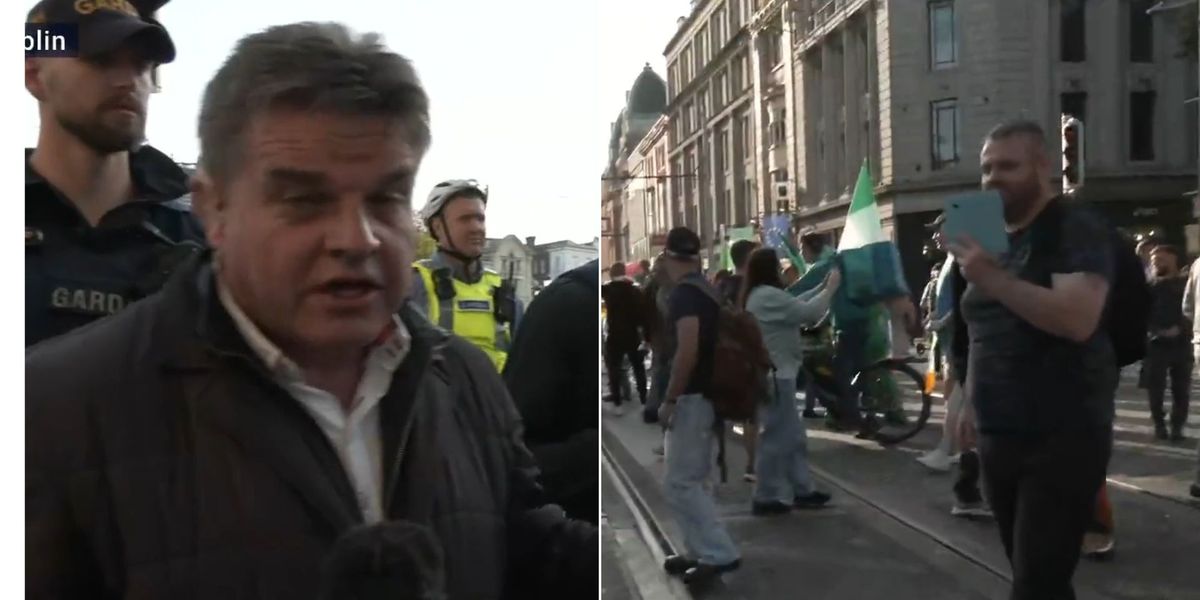Rising Tensions: Anti-Immigration Protests in Dublin
In recent weeks, Dublin has witnessed a surge in anti-immigration protests, reflecting growing discontent among certain segments of the population regarding the country’s immigration policies. The protests have escalated into confrontations with law enforcement, highlighting the complexities of public sentiment surrounding immigration in Ireland.
The Scene of the Protests
On the streets of Dublin, demonstrators gathered, brandishing banners emblazoned with slogans such as "Erin Go Bragh" and "You’ll Never Beat the Irish." These expressions of national pride were juxtaposed against the backdrop of a tense standoff with the Garda, Ireland’s national police service. GB News reporter Dougie Beattie provided live coverage from the heart of the protests, capturing the palpable frustration among the crowd.
Beattie noted that the protesters were not a fringe group but rather comprised everyday working-class individuals, many of whom felt their voices were being stifled. As tensions escalated, police moved in to disperse the crowd, leading to several arrests. Beattie reported that the protesters were being pushed back up the street, a tactic that only seemed to amplify their frustrations.
Voices of Dissent
The protesters expressed a strong desire to be heard, marching towards the doors of parliament to convey their concerns directly to lawmakers. Beattie emphasized the uniqueness of his position as one of the few media representatives on the ground, stating, "They just want a voice. And instead, they’re being marched down the street like this." This sentiment resonated with many in the crowd, who felt that their grievances regarding immigration were being ignored by those in power.
As the situation intensified, Beattie himself faced threats of arrest for simply reporting on the events unfolding around him. His experience served as a stark reminder of the challenges faced by journalists covering contentious issues, particularly in volatile environments.
Political Context
The protests are occurring against a backdrop of shifting political dynamics in Ireland. Recent polls indicate a rise in support for Fine Gael, led by Taoiseach Simon Harris, who has adopted a firmer stance on immigration. This political shift is reflective of broader societal concerns regarding the increasing number of asylum seekers entering the country.
In fact, Ireland has seen a significant rise in asylum applications, with numbers nearly doubling in the first half of 2023 compared to the previous year. This influx has sparked heated debates about the adequacy of current immigration policies and the government’s response to the challenges posed by rising numbers of newcomers.
Government Response and Controversial Policies
In response to the growing number of asylum seekers, the Irish government is contemplating a controversial policy that would charge working asylum seekers up to €238 per week for accommodation, food, and essential services like WiFi. This proposal aligns with practices in other European nations, such as France, Germany, and Spain, but has raised concerns among advocates who argue it could further marginalize vulnerable populations.
The government’s approach has not only fueled protests but has also led to incidents of anti-migrant violence, including arson attacks targeting migrant accommodations. These developments have heightened tensions within communities and underscored the urgent need for a comprehensive and compassionate immigration strategy.
The Protest Experience
As the protests unfolded, demonstrators directed their ire at political parties, chanting slogans such as "Sinn Féin are traitors" and "Fine Gael are traitors." The atmosphere was charged, with heavy-duty barriers erected to keep protesters away from Leinster House, the seat of the Irish parliament. This physical separation between the government and the demonstrators illustrated the widening chasm between the two sides.
The protests have become a focal point for broader discussions about national identity, social cohesion, and the challenges of integrating newcomers into Irish society. As the government grapples with these issues, the voices of those protesting against immigration policies are likely to continue resonating in the public sphere.
Conclusion
The anti-immigration protests in Dublin are a reflection of deeper societal anxieties regarding immigration and national identity. As tensions rise and the government considers new policies, it is crucial for all stakeholders—protesters, lawmakers, and the media—to engage in constructive dialogue. Only through understanding and addressing the concerns of all parties can Ireland hope to navigate the complexities of immigration in a way that fosters unity and inclusivity.
